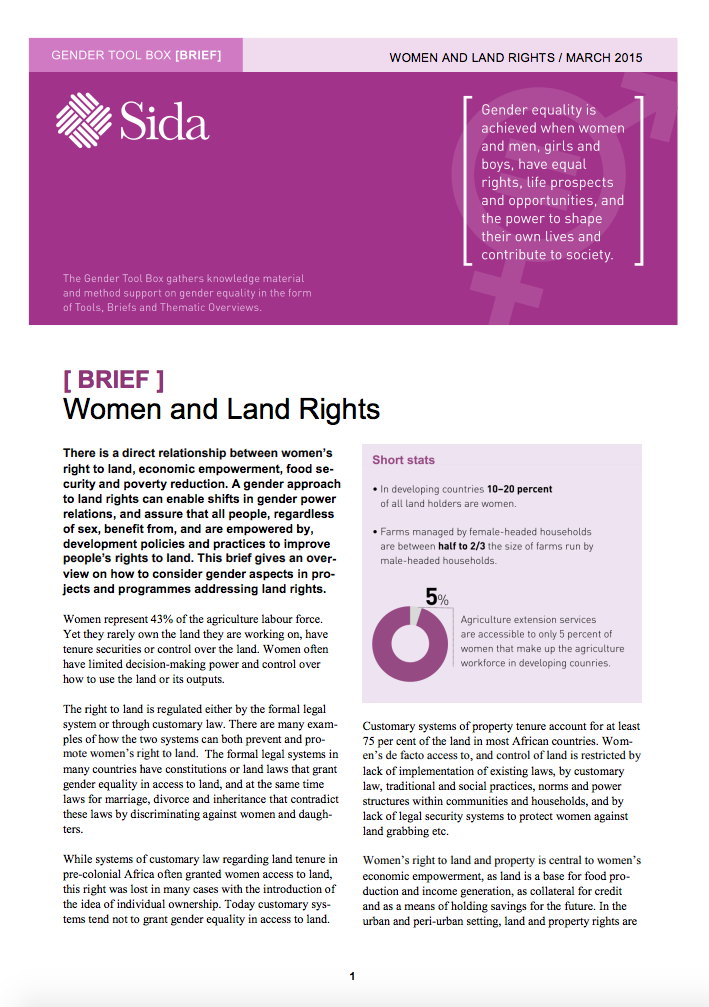Water, women and local social organization in the Western Kenya highlands
Safe water is widely recognized as both a fundamental human need and a key input into economic activity. Across the developing world, the typical approach to addressing these needs is to segregate supplies of water for domestic use from water for large-scale agricultural production. In that arrangement, the goal of domestic water supply is to provide small amounts of clean safe water for direct consumption, cleaning, bathing and sanitation, while the goal of agricultural water supply is to provide large amounts of lower quality water for irrigated agriculture.
Participatory assessment of the sustainability of livelihoods in the agroecosystem of Abesard, Iran
In order to improve the livelihoods of communities and make them more sustainable, study of the vulnerability of livelihoods seems necessary. In this paper, participatory vulnerability analysis was used within a sustainable rural livelihoods framework to assess the sustainability of livelihoods in the agroecosystem of Abesard, Iran. In addition, this paper explored vulnerability contexts that affect livelihood assets. Findings revealed that land use change, climate variability, market fluctuations and higher mechanisation were the main reasons of vulnerability.
Women’s land rights as a pathway to poverty reduction
Land is an important asset for rural households, and having secure land rights is important for poverty reduction. Despite the large body of literature on the relationship between land tenure security, livelihoods, and poverty, most of this literature is based on household-level data and does not consider possible intrahousehold inequalities in land ownership.
Using Administrative Data for Monitoring and Improving Land Policy and Governance in India
The study tried to assess the state of data in India, particularly to track and report two critical land governance indicators viz. women land rights and forest rights, critical to ensure equity and sustainability in terms of public policy.
With UN’s SDG, defining similar indicators, study also attempts in aligning them around SDG indicators. Status of these two parameters were analyzed using nation-wide datasets collecting whole population data, through census of India, Agriculture Census operations following robust processes and reporting them open access.
Minutes of Technical Validation on Gender Equitable Land Governance Study in Odisha
This workshop was orgainized at Bhubaneswar, India by Center for Land Governance, NRMC, Bhubaneswar with support of The World Bank, New Delhi. In this workshop salient findings on processes and progress made around gender equitable land tenure arrangements, best practices and challenges along with ground-happenings and post –land rights situations captured through community and stakeholders opinions were shared.
Gender Equitable Land Governance in Odisha, India: An analysis through VGGT-Gender Lens
This paper analyzes the state’s Land Governance in terms of the five themes for
administrators, technicians and professionals working in the land sector as per the gender-framework of FAO’s VGGT along with an additional theme on community perspectives on women land rights, and recommends strategies for moving towards it.
Administrative and Open Source Data for Monitoring Land Governance: Mapping Women Land Rights in the Context of UN’s SDG in India
This paper was presented at the “2017 WORLD BANK CONFERENCE ON LAND AND POVERTY”, The World Bank - Washington DC. This paper provides a comparative appreciation of all the datasets especially the metadata and methodology along with a SWOT vis-à-vis reporting requirement of SDG indicator.
Women and Land Rights
There is a direct relationship between women’s right to land, economic empowerment, food security and poverty reduction. A gender approach to land rights can enable shifts in gender power relations, and assure that all people, regardless of sex, benefit from, and are empowered by, development policies and practices to improve people’s rights to land. This brief gives an overview on how to consider gender aspects in projects and programmes addressing land rights.
Strengthening Dryland Women's Land Rights
Land and land-based natural resources are the foundation of livelihoods for millions of people and are related to social, cultural and spiritual identity. This is particularly the case for drylands people, who, due to low and variable rainfall and water availability, have developed adaptive strategies in response to seasonal, climatic and environmental change. Gender role norms play an important role in these dynamics, where men and women often undertake different livelihood activities to manage difficult ecological conditions.
2017 High Level Political Forum Thematic review of SDG 5: Achieve gender equality and empower all women and girls
The gender-responsive implementation of the 2030 Agenda for Sustainable Development presents an enormous opportunity to achieve gender equality, end poverty and hunger, combat inequalities within and among countries, build peaceful, just and inclusive societies, protect and promote human rights, and ensure the lasting protection of the planet and its natural resources. The SDGs provide an important framework for collective action to achieve gender equality and the empowerment of all women and girls and the realization of their full enjoyment of all human rights.
Rural Agricultural Livelihood Survey
The Rural Agricultural Livelihood Survey (RALS) is a new panel survey designed to obtain a comprehensive picture of Zambia’s small- and medium-scale farming sector using the 2010 census sampling frame. An earlier household panel survey for rural Zambia was the Supplemental Surveys (SS) of 2001, 2004 and 2008, which enabled the publication of a large set of important research outputs by IAPRI, Michigan State University and a range of Zambian and international partner organizations.





